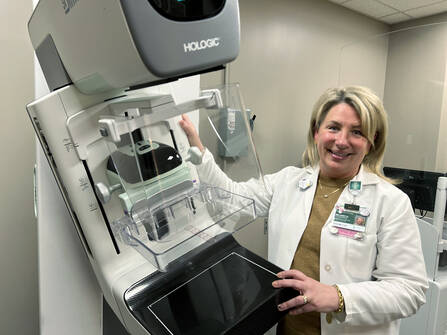Getting the answers you need to make the best decisions about your health
At Cheshire Medical Center, highly skilled health care professionals use advanced technology and work in our diagnostic and radiology departments 24 hours a day, seven days a week.
This ensures we produce fast, accurate test results to help your medical team design the best plan of care for your health.
How do I get my results?
Please call the office of the doctor who ordered the test, not the department that performed the test. Your test results are visible to both you and your medical team in the myDH patient portal; however, only your medical team can tell you what the results mean for your health.
Radiology and diagnostic imaging
Our board-certified radiologists and technologists provide high-quality images and procedures while prioritizing your comfort and safety. For example, we have invested in state-of-the-art equipment that allows us to provide detailed MRI tests with 97% less noise and satellite radio at your request. Having earned a Designated Comprehensive Breast Imaging Center accreditation, our staff and facility offer you the highest level of safety and image quality available with compassionate care.
Learn about and schedule testing
Bone density testing
A bone density test determines if you have osteoporosis, a disorder characterized by bones that are more fragile and more likely to break. We use X-rays to measure how much calcium and other bone minerals are packed into a segment of bone. Generally, women over 65, men over 70, and those at high risk of osteoporosis should schedule a bone density test every two years.
Make an appointment: Contact your primary care provider to issue an order for this test, then call 603-354-5454 ext. 8430 to schedule your appointment.
Location: Register in the lobby, take the elevator to second floor Central, then check-in at the Women’s Health desk.
Breast imaging
Our nationally accredited Breast Care Center offers 3D mammography (tomosynthesis) for your routine screenings. Regular breast screenings are important because they are the best way to find breast cancer early, when a cure is most likely and there are more treatment choices. 3D mammography is better than a traditional mammogram because it offers greater accuracy, improved comfort, and lower exposure to radiation.
The American College of Radiology recommends women over 40 get a mammogram every year. Your provider may recommend earlier screenings if you have a higher risk of breast cancer.
Make an appointment: You do not need a doctor’s order to schedule a mammogram, just call 603-354-6580.
Location: Register in the lobby, take the elevator to second floor Central, then check-in at the Women’s Health appointment desk.
Other breast diagnostics: If our pathologists recommend further testing after your 3D Mammogram, the Breast Care Coordinator will contact you to coordinate the next steps in your care.
CT (CAT) scan
CT scans use a combination of X-rays and computer technology to produce cross-sectional image slices of the body. These can be added together to give a 3-dimensional view. A scan shows detailed images of any part of the body, including the bones, muscles, fat, and organs. While you lie on a table for the test like an MRI, CT scans are much faster and quieter.
Make an appointment: Once your doctor has placed an order for a CT scan, call 603-354-6580 to schedule your appointment.
Location: Register in the lobby, then take the hallway on the left beyond Registration. Turn right and check-in at the Radiology Department desk.
EEG (electroencephalogram)
If you have signs or symptoms of a neurological condition or brain disorder, your doctor may order an EEG. Your brain cells communicate through electrical impulses and are active all the time, even when you're asleep. An EEG can be used to help detect potential problems associated with this activity. It is one of the main diagnostic tests for epilepsy.
A specialized technician will place small, metal discs (electrodes) on your scalp. An instrument called an electroencephalograph records your brain waves onto a computer. Once you’ve had an EEG, a physician will read the data and explain what it means.
Make an appointment: Once your doctor has placed an order for an EEG, our EEG tech will reach out to you to schedule an appointment and explain the test.
Location: Register in the lobby, then take the hallway on the left beyond Registration. Turn right and check-in at the Radiology Department desk.
Endoscopy / colon screenings
Endoscopy is the insertion of a long, thin tube directly into the body to observe an internal organ or tissue in detail. It can also be used to carry out other tasks including imaging and minor surgery. Endoscopes are minimally invasive and can be inserted into the openings of the body such as the mouth or anus.
This test is most often performed to screen for, and sometimes prevent, colorectal cancer—one of the leading preventable causes of death for both men and women. If you are over 50 and your provider has not recommended you have a colon screening, call Gastroenterology today to find out which colorectal cancer screening is right for your needs.
Make an appointment: Call Gastroenterology
Location: Register in our main lobby.
MRI (Magnetic Resonance Imaging)
MRI uses a strong magnetic field and radiofrequency waves to produce detailed images of your internal organs, muscles, connective tissue, and central nervous system. This test reveals more details than others and can show the difference between healthy and diseased tissue. It does not use any ionizing radiation and is painless with no known permanent side effects.
Cheshire’s MRI suite is equipped with a 1.5T scanner that offers a quieter exam and can accommodate a large variety of patient sizes, shapes, and conditions. Many tests can be done with the patient’s head outside the unit and we provide satellite radio to help you relax.
Please tell the ordering physician if you are claustrophobic or think you may be anxious during this test. The ordering doctor may prescribe some medication to help relax you during the MRI.
Make an appointment: Once your doctor has placed an order for an MRI, call 603-354-6580 to schedule your appointment.
Location: Register in the lobby, then take the hallway on the left beyond Registration. Turn right and check in at the Radiology Department desk.
Safety: It is very important that you fill out your safety assessment completely and remove all metal objects from your body because the magnets used in this test are extremely strong.
Nuclear medical exam
Nuclear medicine is a safe, painless, and cost-effective technique to image the body and treat disease. Nuclear medicine uses very small amounts of radioactive materials, similar to the amount received during a diagnostic X-ray.
Depending on the type of nuclear medicine exam, a radiotracer is either injected into a vein, swallowed, or inhaled as a gas. This makes its way to the area of your body being examined, where it gives off energy in the form of gamma rays. These are captured by special cameras to show details on both the structure and function of organs and tissues.
Make an appointment: Once your doctor has placed an order for Nuclear Medicine, call 603-354-6580 to schedule your appointment.
Location: Register in the lobby, then take the hallway on the left beyond Registration. Turn right and check in at the Radiology Department desk.
PET (Positron Emission Tomography) scan
PET scans are nuclear medicine scans that use tiny amounts of a radioactive tracer to help show changes in cellular activity and organ function. At Cheshire, we also use the most advanced combination of PET and CT scans to detect changes in cell activity within the detailed structural image shown by the CT.
This revolutionary “fusion” technology enables your medical team to detect the presence of disease earlier and pinpoint its location with much greater accuracy. This test is very helpful in showing detailed information about problems such as cancers, neurological conditions like Alzheimer’s disease, and cardiovascular disease.
Make an appointment: Once your doctor has placed an order for a PET scan, call 603-354-6580 to schedule your appointment.
Location: Register in the lobby, then take the hallway on the left beyond Registration. Turn right and check in at the Radiology Department desk.
Ultrasound
During an ultrasound, a sonographer technician uses a transmitting device to send out high-frequency ultrasound waves. These harmless sound waves, which contain no radiation, bounce off the surfaces of objects they hit. The reflected sound forms an echo, and that echo is turned into a visual representation on a screen.
In addition to many routine ultrasound tests, Cheshire offers vascular ultrasounds and is accredited by the Intersocietal Commission for the Accreditation of Vascular Laboratories.
Make an appointment: Once your doctor has placed an order for an Ultrasound, call 603-354-6580 to schedule your appointment.
Location: Register in the lobby, then take the hallway on the left beyond Registration. Turn right and check in at the Radiology Department desk.
X-ray
An X-ray image, or radiograph, is produced when a small amount of radiation passes through a body part and is recorded on film, screen, video, or computer to produce a black-and-white anatomical image. Areas that are denser, such as bone, appear white on the X-ray film.
Fluoroscopy is a study of moving body structures—similar to an X-ray ‘movie’. A continuous X-ray beam is passed through the part of the body being examined so that the body part and its motion can be viewed in detail.
Appointment and location: Please check with your provider placing the order for your x-ray to find out which location they are referring you to. X-rays are provided in Cheshire Radiology Departments in the South Building, Orthopedics and Podiatry in the North Building, and OBGYN in the Central Building (Mammography and Bone Density only).
NOTE: As of May 10, 2021, Cheshire's Radiology Department, along with all members Dartmouth Health, will no longer be using routine lead shielding during X-rays, following guidance from the American Association of Physicists in Medicine.
Learn more in our X-ray shielding change FAQ.
Billing for radiology services
Please note, some radiology services are billed separately from those provided through Cheshire Medical Center or Dartmouth Health system providers and cannot be paid through myDH. Please follow the instructions on the invoices you receive.
Laboratory for blood and urine testing
The phlebotomists in our fully accredited lab are experienced at setting you—or your child—at ease if you are nervous about blood tests. Our lab is also staffed with highly-trained technicians and pathologists 24 hours a day, so your doctor has fast access to the results they need to give you the best care. Learn more about lab testing.

